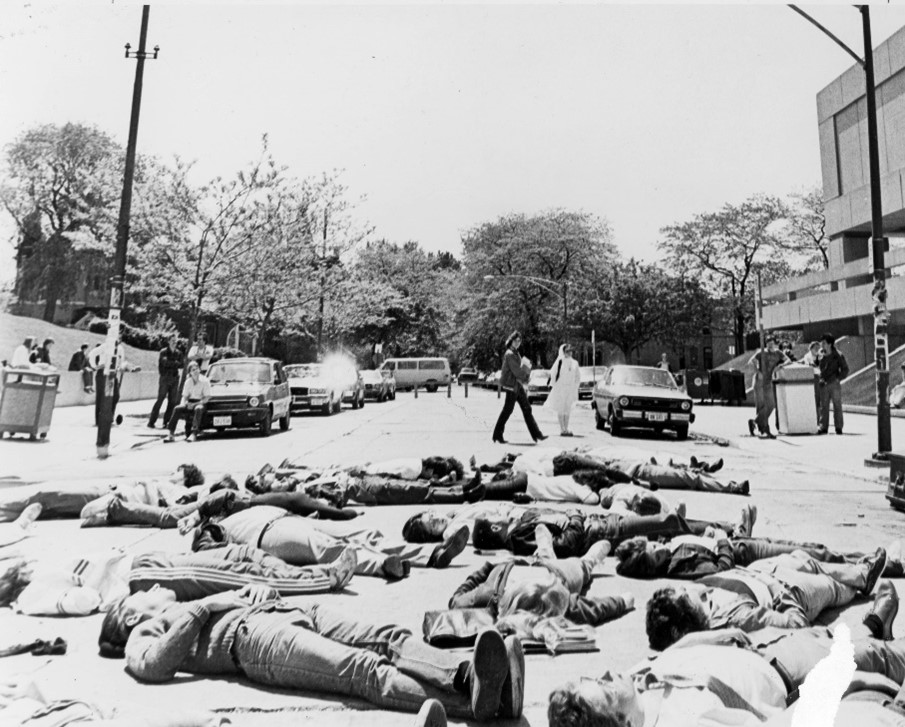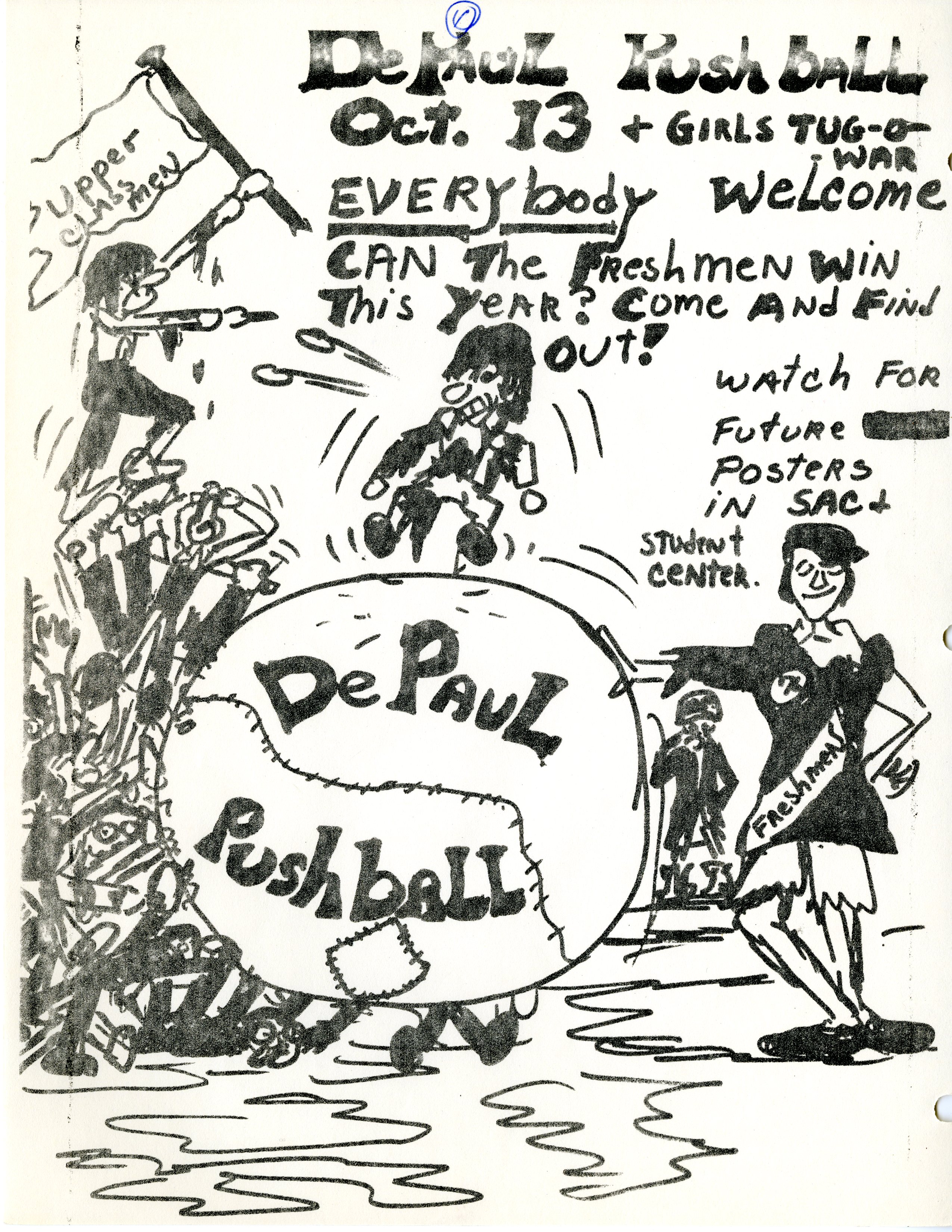 Students demonstrate in an anti-war protest on the Lincoln Park Campus in 1970. (Image courtesy of Special Collections and Archives)
Students demonstrate in an anti-war protest on the Lincoln Park Campus in 1970. (Image courtesy of Special Collections and Archives)DePaul's annual Alumni & Family Weekend has begun, and many alumni and friends will come together in-person and virtually for the weekend's events. This year the Class of 1971 celebrates its 50th reunion. In honor of that occasion, Special Collections and Archives will look back at what student life and culture was like 50 years ago at DePaul.
In the fall of 1970, there was a good amount of uncertainty about what the new academic year would bring for students, faculty and administrators — not only at DePaul, but on campuses across the nation. The previous academic year had ended in turmoil and unrest, following the U.S. bombing of Cambodia and the shootings at Kent State University. At DePaul, anti-Vietnam War demonstrations and student strikes broke out on the Lincoln Park Campus and traveled to the Loop Campus.
By the start of the 1970-71 academic year, the broad-based student support for demonstrations and protests from the year before had dwindled, but the impact of the student movement was still evident. DePaul established the first University Senate, which included students and staff, in addition to faculty and administrators, giving each group a representative voice in the university's affairs. DePaul student Flemmie Wilson, the president of the Student Activity Council that year, changed the group's name to the Student Government Association, to signify the new era of student representation in university governance. The vice president of the Student Government Association, Tom Myers, expressed his views about the campus climate that fall in an interview.
“What's going on seems to be a reappraisal of last year and the role of the student in effecting change in society," he said.
One example of that student impact was the Breakfast Program, founded by students James Hammonds and Michael Walters. The program served free meals to Lincoln Park neighborhood children. The university provided a space to host the breakfast in the basement of Byrne Hall. DePaul students organized the program and raised funds for the meals by hosting a songfest, a carwash and a student-faculty basketball game.
The annual pushball contest, where freshmen faced upperclassmen in a battle to push a 6 foot, 50 pound ball through goal posts at opposite ends of a muddy field, also took place that fall.
 Flyer for the annual pushball contest, circa 1970s. ( Image courtesy of Special Collections and Archives)
Flyer for the annual pushball contest, circa 1970s. ( Image courtesy of Special Collections and Archives)Students on the Lincoln Park Campus were likely to be hanging out in The Pit, which the 1970 freshman orientation guide describes as “the scene of conversation, guitar strumming, and general socializing." Other hangouts included Kelly's Pub on Webster Ave. The Kingston Mines Company Store opened that year as a gathering place geared for DePaul students with coffee and food, as well as an evening entertainment schedule featuring comedy, music and poetry readings. Downtown in the Lewis Center, home to law, commerce, music and drama students, the cafeteria was the hub of student activity.
In Athletics, the 1971 season was tough for DePaul men's basketball. The Blue Demons only won eight games and lost seventeen. While it was undoubtedly a long season for Coach Ray Meyer and his team, a few players stood out, including Joe Meyer, who finished third on the university's all-time scoring list, and Ed Goode, who recorded the highest single game total of the season, scoring 34 points.
In the spring of 1971, the band Chicago played a special show at Alumni Hall. The band was founded at DePaul a few years earlier in 1967, by music students Walt Parazaider, Lee Loughnane and James Pankow—along with four other local musicians and friends of the DePaul trio. Parazaider thanked many of his professors at DePaul for playing a role in his music career. The event raised $5,000 to establish a music scholarship fund at DePaul.
 The band Chicago playing at Alumni Hall, May 13, 1971. (Image courtesy of Special Collections and Archives)The academic year wrapped as it typically does, with commencement. The June 1971 ceremonies took place downtown at the Auditorium Theater. The highpoint for many in attendance was the presentation of an honorary degree and the St. Vincent DePaul Award to gospel singer Mahalia Jackson, who sang for graduates in what would be one of her last public appearances.
The band Chicago playing at Alumni Hall, May 13, 1971. (Image courtesy of Special Collections and Archives)The academic year wrapped as it typically does, with commencement. The June 1971 ceremonies took place downtown at the Auditorium Theater. The highpoint for many in attendance was the presentation of an honorary degree and the St. Vincent DePaul Award to gospel singer Mahalia Jackson, who sang for graduates in what would be one of her last public appearances.
These highlights from the 1970-71 academic year at DePaul are documented in the records, papers, photographs and memorabilia held in DePaul Special Collections and Archives. If you have questions about these collections or if you want to share your own memories and perspective on your time at DePaul, please contact the department.
Brittan Nannenga is a university archivist in the DePaul University Library.